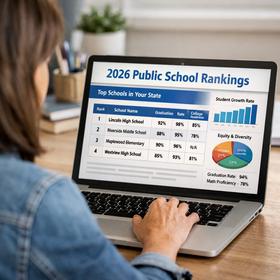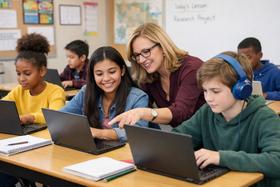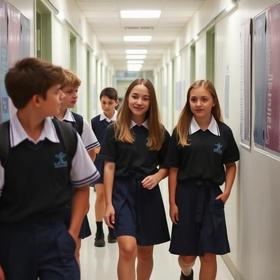Ruhuma Junior High School ranked #722 in Alabama in 2023, showing an overall improvement from #766 in 2022 but still placing in the bottom 50% statewide.
Math proficiency ranged from 20–24% in 2023, which was lower than the state average of 30%, with a declining trend from higher rates in earlier years.
Reading proficiency was between 35–39%, also lower than the state average of 47%, and science proficiency varied from 21–39%, falling below the state average of 38%.
Enrollment slightly increased to 165 students in 2023 with a steady 13:1 student–teacher ratio; 73% of students qualified for free lunch, reflecting a rise in low–income student population compared to previous years.
Minority enrollment was approximately 31%, primarily American Indian students numbering 38 out of 163 total.
The school served grades Pre–K through 8 with a total enrollment of 163 students in 2023, consistent with prior years, and maintained Title I eligibility under the Dekalb County education agency.
Graduation rates consistently exceeded the state average, reaching 95% in 2023 compared to the state rate of 88%, representing strong completion outcomes for this Alabama junior high school.
Quick Facts (2026)
- Grades: Prekindergarten-8
- Enrollment: 163 students
- Student-Teacher Ratio: 13:1
- Minority Enrollment: 31%
- Overall Testing Rank: Bottom 50% in AL
- Math Proficiency: 20-24% (Btm 50%)
- Reading Proficiency: 35-39% (Btm 50%)
- Science Proficiency: 21-39% (Btm 50%)
- Source: National Center for Education Statistics (NCES), AL Dept. of Education
Top Rankings
Ruhuma Junior High School ranks among the top 20% of public schools in Alabama for:
Category
Attribute
Community Size
Student Attention
School Overview
Ruhuma Junior High School's student population of 163 students has stayed relatively flat over five school years.
The teacher population of 13 teachers has grown by 18% over five school years.
Grades Offered
Grades Prekindergarten-8
(No virtual instruction)
(No virtual instruction)
Total Students
163 students
Gender %
Total Classroom Teachers
13 teachers
School Rankings
Ruhuma Junior High School ranks within the bottom 50% of all 1,275 schools in Alabama (based off of combined math and reading proficiency testing data).
The diversity score of Ruhuma Junior High School is 0.47, which is less than the diversity score at state average of 0.63. The school's diversity has stayed relatively flat over five school years.
Overall Testing Rank
#722 out of 1275 schools
(Bottom 50%)
(Bottom 50%)
Math Test Scores (% Proficient)
20-24%
30%
Reading/Language Arts Test Scores (% Proficient)
35-39%
47%
Science Test Scores (% Proficient)
21-39%
38%
Student-Teacher Ratio
13:1
17:1
American Indian
23%
1%
Asian
n/a
1%
Hispanic
6%
11%
Black
1%
32%
White
69%
51%
Hawaiian
n/a
n/a
Two or more races
1%
4%
All Ethnic Groups
Participates in the National School Lunch Program (NSLP)
Yes
Eligible for Free Lunch
72%
56%
Eligible for Reduced Lunch
7%
5%
School Statewide Testing
School District Name
Source: National Center for Education Statistics (NCES), AL Dept. of Education
Frequently Asked Questions
What is Ruhuma Junior High School's ranking?
Ruhuma Junior High School is ranked #722 out of 1,275 schools, which ranks it among the bottom 50% of public schools in Alabama.
What percent of students have achieved state testing proficiency in math and reading?
20-24% of students have achieved math proficiency (compared to the 30% AL state average), while 35-39% of students have achieved reading proficiency (compared to the 47% AL state average).
How many students attend Ruhuma Junior High School?
163 students attend Ruhuma Junior High School.
What is the racial composition of the student body?
69% of Ruhuma Junior High School students are White, 23% of students are American Indian, 6% of students are Hispanic, 1% of students are Black, and 1% of students are Two or more races.
What is the student-teacher ratio of Ruhuma Junior High School?
Ruhuma Junior High School has a student ration of 13:1, which is lower than the Alabama state average of 17:1.
What grades does Ruhuma Junior High School offer ?
Ruhuma Junior High School offers enrollment in grades Prekindergarten-8 (No virtual instruction).
What school district is Ruhuma Junior High School part of?
Ruhuma Junior High School is part of Dekalb County School District.
School Reviews
5 10/10/2025
This is a great school all tho it's small.It's easy to make new friends,and
the faculty memebers and the nurse are realy great people.
Review Ruhuma Junior High School. Reviews should be a few sentences in length. Please include any comments on:
- Quality of academic programs, teachers, and facilities
- Availability of music, art, sports and other extracurricular activities
Recent Articles

Public School Rankings: Are They Accurate in 2026?
Are public school rankings accurate? Learn how rankings are calculated in 2026, what they miss, and how families can evaluate schools wisely.

How Are U.S. Public Schools Doing in 2026?
A 2026 update on how U.S. public schools are performing academically, financially, and socially in a post-pandemic era.

Helping Your Child Navigate Friendship Drama at School
Meta Description: Practical 2026 strategies for helping your child navigate friendship drama at school with confidence, empathy, and resilience.





